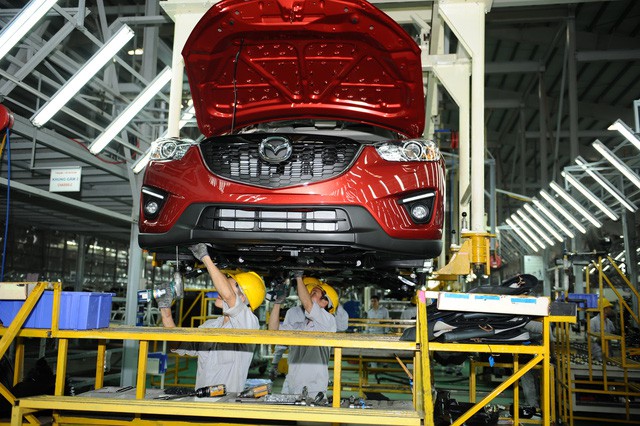With prices of imported cars in Vietnam soaring due to supply shortage caused by new import regulations, dealerships of locally-assembled vehicles are grabbing the golden opportunity to offer price cuts to attract buyers.
Thaco Truong Hai has cut the prices of different models of its Kia product line, including Kia Morning, Kia Cerato, Optima and Rondo, by VND5 – 50 million (US$220-$2,200) from February.
The Kia Rondo model receives the biggest price cut of VND50 million, now selling at VND749 million ($33,000), while the respective price reductions for Kia Cerato and Kia Optima are up to VND14 million ($620) and VND30 million ($1,300).
A Kia Optima now fetches only VND789 million ($34,750) compared to the previous rate of VND819 million ($36,000).
These vehicles are all assembled in Vietnam.
 |
| A Thaco Truong Hai assembled car. Photo: Tuoi Tre |
Vietnamese automakers are benefiting from the government’s Decree 116, taking effect from this year, which applies stricter regulations on car imports. As a consequence, carmakers and importers in Vietnam have been lamenting that they cannot import new stock to meet the current demand.
Many car sellers have thus taken advantage of the supply shortage to hike prices for the available stock, boosting prices well above what they would be with the tariff.
The move has left local consumers disappointed, while creating great opportunities for Vietnamese automakers to lure buyers by slashing their prices. It was also good timing for carmakers as this time of the year is the typical Lunar New Year holiday buy-up.
 |
| A Mercedes-Benz is seen at a showroom in Ho Chi Minh City. Photo: Tuoi Tre |
Toyota Vietnam, which has its imported products hit by the new regulations, has also cut prices for units assembled in Vietnam by 3-10 percent, or VND25-58 million per car, to embrace the chance.
Similarly, Mitsubishi Vietnam is selling the locally assembled 5+2 crossover Mitsubishi Outlander at some VND200 million ($8,800) cheaper than the completely-built unit imported from Japan.
Dealerships have also provided a VND114 million ($55,000) price cut for the Isuzu mu-X assembled in Vietnam.
Some Mazda models, including Mazda3, Mazda2 and Mazda6, are also available with prices slashed by VND10-40 million ($440-$1,700) each.
 |
| Employees work at a car assembling factory in Vietnam. Photo: Tuoi Tre |
Representatives of car importers such as Ford and Honda lament that Decree 116 has made it extremely difficult to import new products to Vietnam.
The fiat requires all models of imported vehicles to obtain a Vehicle Type Approval certification issued by authorities in the exporting country. The problem is that most countries that sell cars to Vietnam don’t use such a document and it will take time for exporters to enact measures to meet those requirements.
The decree has effectively closed the door for car importers to bring new stock into Vietnam until changes are made. For instance, Ho Chi Minh City seaports received no car shipment in January, with the new regulations to blame.
Data from the Vietnam Customs also shows that only 80 cars, including a mere six vehicles with nine or less seats, were imported to the Southeast Asian country in the first half of January.
To put this into perspective, the country imported 7,000 units worth $153 million in January 2017.
Like us on Facebook or follow us on Twitter to get the latest news about Vietnam!




















































